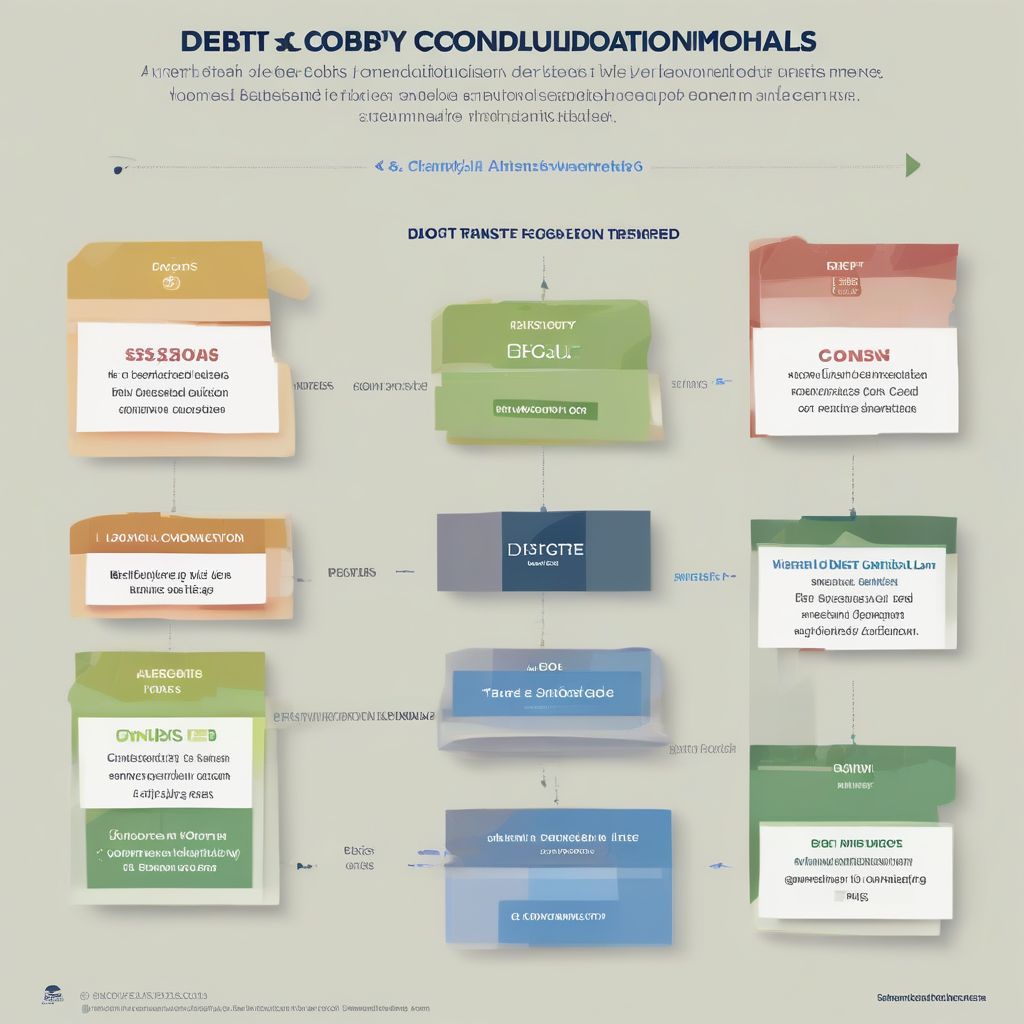Ever feel like you’re juggling too many bills? Like a plate spinner at a circus, trying to keep all your debts from crashing down? You’re not alone. Millions of people struggle with multiple debts, and the stress can be overwhelming. But there’s a way to simplify your finances and potentially save money: debt consolidation. Done right, it can be a powerful tool to regain control of your finances without damaging your credit score. Let’s dive into how to consolidate debt without hurting your credit.
Understanding Debt Consolidation
Debt consolidation involves combining multiple debts, like credit cards, medical bills, or personal loans, into a single new loan with (ideally) a lower interest rate and a fixed monthly payment. This simplifies your finances, making it easier to track and manage your debt.
Types of Debt Consolidation
There are several ways to consolidate debt:
- Balance Transfer Credit Cards: Transfer high-interest balances to a card with a 0% introductory APR. Be mindful of balance transfer fees and the regular APR after the introductory period ends.
- Debt Consolidation Loans: Personal loans specifically designed for consolidating debt. These loans offer fixed interest rates and repayment terms.
- Home Equity Loans or Lines of Credit (HELOCs): Using your home’s equity to secure a loan or line of credit. Offers lower interest rates, but risks your home if you default.
- Debt Management Plans (DMPs): Working with a credit counseling agency to create a repayment plan with creditors. This may lower interest rates and monthly payments, but may negatively impact your credit score.
How to Consolidate Debt Without Hurting Your Credit
Here’s the key: consolidating debt strategically. It’s not a magic bullet; it requires careful planning and execution.
1. Check Your Credit Score
Before you apply for any new credit, know your credit score. This will give you a realistic idea of the interest rates you might qualify for. You can check your credit score for free through various online platforms.
2. Research and Compare Lenders
Shop around for the best interest rates and loan terms. Compare different lenders, including banks, credit unions, and online lenders. Don’t rush into the first offer you see.
3. Choose the Right Consolidation Method
Consider your individual financial situation and choose the method that best suits your needs. If you have good credit, a balance transfer card or a debt consolidation loan might be suitable. If you’re struggling with debt, a DMP might be a better option.
4. Avoid Closing Old Accounts
After consolidating your debts, avoid closing your old credit card accounts, especially if they have a long history. Closing accounts can shorten your credit history and negatively impact your credit utilization ratio, potentially lowering your credit score.
5. Create a Budget and Stick to It
Debt consolidation is only effective if you address the underlying spending habits that led to debt in the first place. Create a realistic budget and stick to it to avoid accumulating more debt.
The Benefits of Smart Debt Consolidation
Consolidating your debts wisely can offer several benefits:
- Lower Interest Rates: Potentially saving you money on interest payments.
- Simplified Payments: One monthly payment instead of multiple bills.
- Improved Credit Score: By making on-time payments consistently, you can improve your credit utilization ratio and overall credit score.
- Faster Debt Repayment: Lower interest rates and structured repayment plans can help you pay off debt faster.
Potential Pitfalls to Avoid
- High Fees: Be wary of balance transfer fees, origination fees, and other hidden costs.
- Higher Interest Rates: If your credit score is low, you may not qualify for the lowest rates.
- Missed Payments: Missing payments on your consolidated loan can damage your credit score.
 Debt Consolidation Chart
Debt Consolidation Chart
Expert Insights on Debt Consolidation
Financial expert, Dave Ramsey, advises, “Debt consolidation is not a cure-all. It’s a tool. If you don’t change your spending habits, you’ll end up right back where you started.” This emphasizes the importance of budgeting and responsible spending.
Real-Life Success Story
“I was drowning in credit card debt and felt hopeless. Consolidating my debts through a personal loan gave me a manageable monthly payment and a lower interest rate. I finally feel in control of my finances.” – Sarah M. (This is a hypothetical testimonial for illustrative purposes.)
Conclusion
Debt consolidation can be a powerful tool to regain control of your finances and improve your financial well-being. By understanding the different consolidation methods, choosing the right strategy for your situation, and maintaining responsible spending habits, you can effectively consolidate debt without harming your credit. Remember, a well-structured plan combined with disciplined budgeting is the key to successful debt management and achieving long-term financial health. What are your thoughts on debt consolidation? Share your experiences and questions in the comments below! Consider exploring our other resources on personal finance and budgeting to further enhance your financial knowledge.



